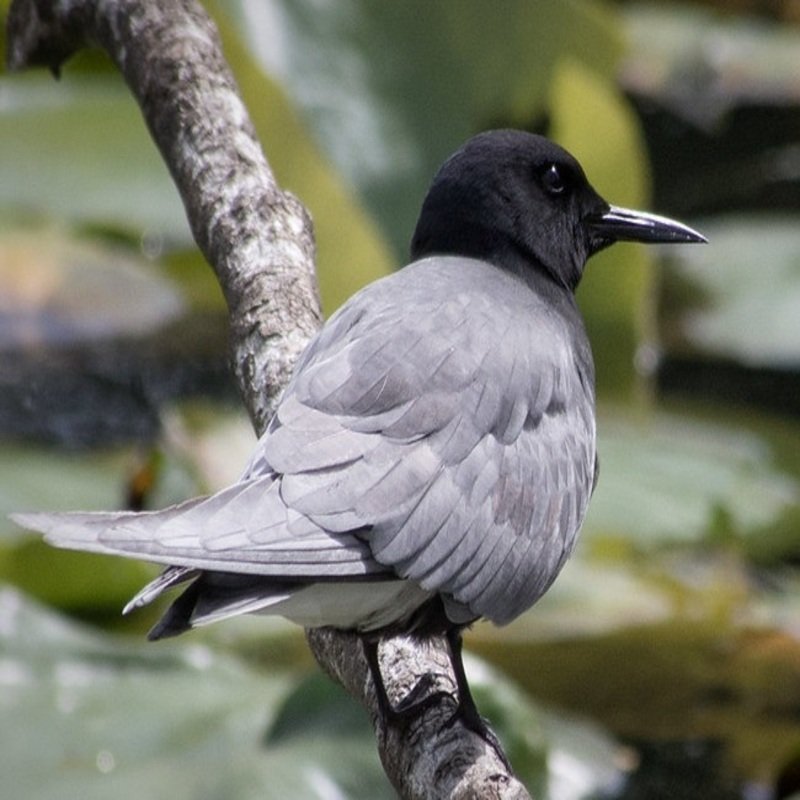The black tern (Chlidonias niger) is a small tern generally found in or near inland water in Europe, Western Asia, and North America. As its name suggests, it has predominantly dark plumage. In some lights it can appear blue in the breeding season, hence the old English name “blue darr”. The genus name is from Ancient Greek khelidonios, “swallow-like”, from khelidon, “swallow”: another old English name for the black tern is “carr swallow”. The species name is from Latin niger “shining black”.
Quick Overview: Chlidonias Niger – Black Tern
Body size: Around 9-10 in (23-25 cm) and a weight of 74 g (2.61 oz)
Main colors: Black, Gray, Gray-White
Range: Throughout the United States
Migratory Bird: Yes
Best time of the year to see in the U.S.: March, April, May, September, October, November
Conservation Status: Least Concern
Black Tern Description
In breeding season, this tern has a black head, neck, and underparts with generally dark plumage. In the fall, it becomes lighter with gray wings. The young are a grayish-white color with dark patches on either side of their head. The tail is small and is only slightly notched compared with other terns.

Size
These birds have a length of 9-10 in (23-25 cm) and a weight of 74 g (2.61 oz). Their wings could range from 20-24 in (51-61 cm).
Feeding
Mostly insects, fish. Diet on breeding grounds is mostly insects, also small fish, tadpoles, frogs, spiders, earthworms, crustaceans, leeches. In migration and winter at sea, eats mostly small fish, also some crustaceans and insects.
Habitat
Fresh marshes, lakes; in migration, coastal waters. For nesting favors fresh waters with extensive marsh vegetation and open water, also sometimes in smaller marshes and wet meadows.
Behavior
This species is quite gregarious and usually nests in colonies; in its migrations, the birds gather in large flocks. Its flight is buoyant and erratic. They are often observed hovering above marshes. When feeding, it circles low over foraging areas with slow, shallow wingbeats and its bill pointed down.
Chlidonias Niger Scientific Classification
- Kingdom: Animalia
- Phylum: Chordata
- Subphylum: Chelicerata
- Class: Aves
- Order: Charadriiformes
- Family: Laridae
- Genus: Chlidonias
- Species: Chlidonias niger
Best time of the year to see
In the United States, the best time of year to see these birds are during the Spring season (March-May) and during the Autumn season (September – November).
Distribution of the Black Tern in the USA
Found from central-eastern Alaska, central Manitoba, and Ontario south to northern California, Colorado, northern Missouri, and Tennessee, also to the lakeshores of northern Ohio, Pennsylvania, and New York. Winters spent from Surinam to Peru and Chile.
The Black Tern can be found in the following states in the United States – Alabama, Arizona, Arkansas, Connecticut, Delaware, Florida, Georgia, Hawaii, Idaho, Illinois, Indiana, Iowa, Kansas, Kentucky, Louisiana, Maine, Maryland, Massachusetts, Michigan, Minnesota, Mississippi, Montana, Nebraska, Nevada, New Hampshire, New Jersey, New Mexico, North Carolina, North Dakota, Oklahoma, Oregon, Rhode Island, South Carolina, South Dakota, Texas, Utah, Vermont, Virginia, Washington, West Virginia, Wisconsin, and Wyoming.
